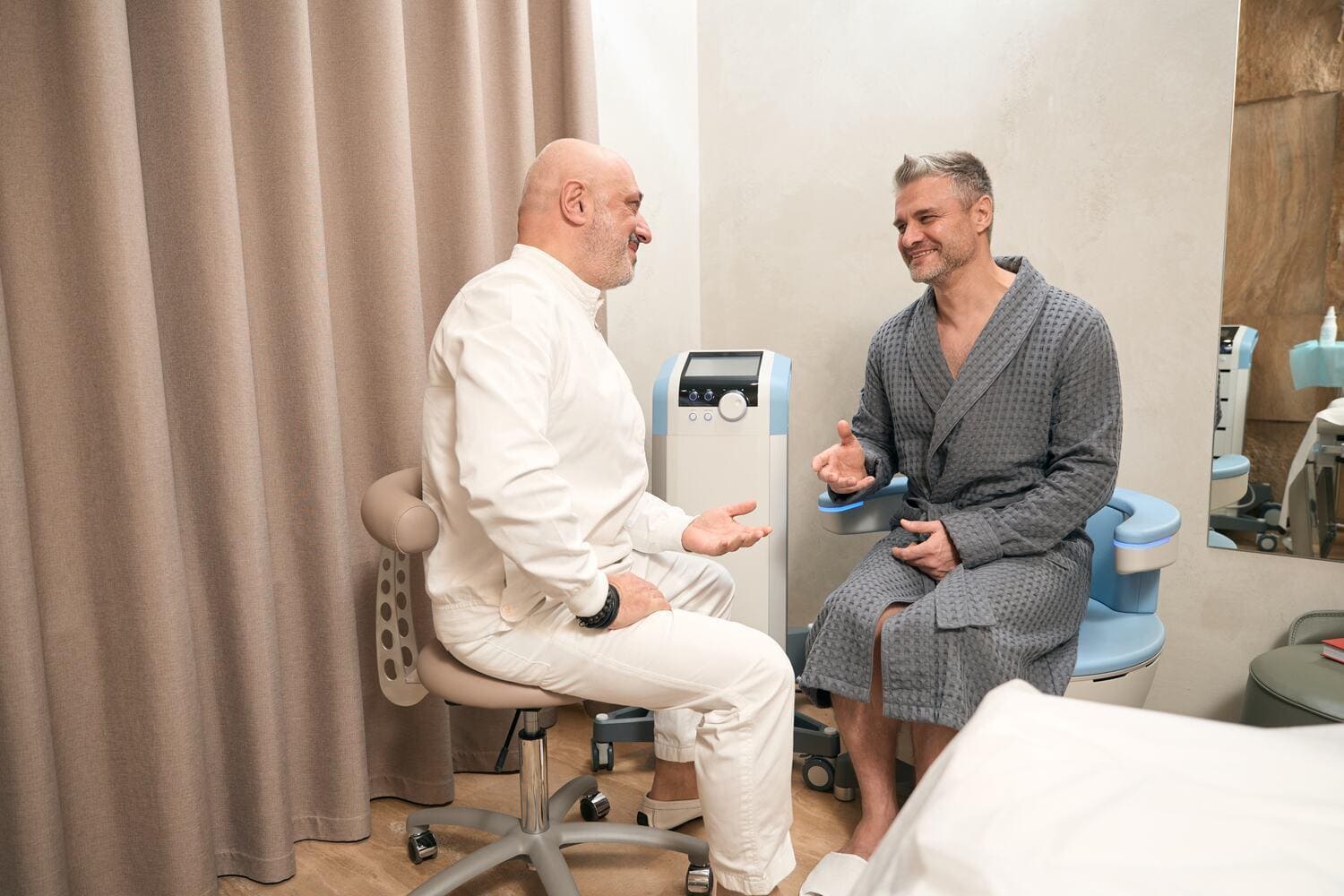- John DiBella
- Published: November 4, 2024
- Fact-checked by Dr. Desiree Granados

Testosterone Replacement Therapy (TRT) has been a life-changer for many men, helping to restore energy, mood, and overall health. But what happens if you decide to stop? There are various reasons why someone might consider stopping TRT, such as experiencing side effects or feeling they no longer need it. Understanding the effects and implications of going off TRT can help you make a more informed choice about whether to continue or discontinue treatment.
Reasons for Stopping Testosterone Replacement Therapy
While testosterone replacement therapy can have significant benefits, there are situations where some men might consider stopping. Common reasons include:
- Health Concerns: Certain health conditions may be exacerbated by TRT, leading some to reconsider this treatment. Regular monitoring with your doctor helps mitigate these risks.
- Side Effects: Although TRT is generally safe, it may sometimes cause side effects like acne, sleep issues, or mood changes, prompting some men to question if it’s worth continuing.
- Personal Goals or Lifestyle Changes: Some men, especially as they get older, might feel that TRT is no longer aligned with their health or fitness goals.

What Happens When You Stop Testosterone Replacement Therapy?
Stopping TRT leads to a number of changes as your body adjusts to the absence of supplemental testosterone. Here’s what to expect:
- Hormonal Adjustments: Your body might take some time to regain balance, particularly if you’ve been on TRT for an extended period. The abrupt drop in testosterone can lead to a cascade of hormonal changes, potentially affecting mood and energy levels.
- Potential Withdrawal Symptoms: Some men experience withdrawal symptoms, including:
- Fatigue or low energy
- Mood swings or depression
- Reduced libido or sexual dysfunction
- Physical changes like muscle loss or increased body fat
- Other Physical and Psychological Effects: As testosterone levels decrease, some individuals might experience changes in muscle mass, body composition, and motivation.
- Return of Low Testosterone Symptoms: If you stop taking TRT, symptoms of low testosterone, such as fatigue, depression, and decreased libido, might return, impacting overall well-being.
Emotional symptoms can vary greatly depending on how long you’ve been on TRT, your age, and your lifestyle habits.
Testosterone Levels After Stopping TRT
Once you stop TRT, your natural testosterone production will likely decrease at first. For some individuals, hormonal levels will stabilize in time, while others who struggle with low testosterone might never experience ideal testosterone levels without the help of TRT. Factors that impact recovery include:- Duration of TRT use: If you’re coming off TRT after 6 months, you might have a different experience compared to someone coming off TRT after 10 years. According to a 2019 study, men who used TRT for a longer period of time are more likely to maintain steady hormone levels after stopping treatment.
- Age: Older men might have a more difficult time achieving ideal testosterone levels again after quitting TRT.
- Active Lifestyle: Living an active lifestyle is one of the biggest predictors for reaching healthy testosterone levels without TRT.
So, how long after stopping testosterone do levels return to normal? It depends. In some cases, testosterone levels may stabilize within a few months, while others may require more time. However, individuals who struggled with Low T prior to treatment might never experience healthy testosterone levels unless they continue TRT.
How to Safely Taper Off Testosterone Therapy
If you’re considering going off TRT, doing so under medical supervision is essential to avoid the hormonal imbalance that can arise from stopping too quickly. Working with a healthcare provider can help you taper off safely, reducing the risk of severe withdrawal symptoms. Here are some steps to consider when tapering off TRT:- Consult Your Healthcare Provider: Discuss your reasons for stopping and ask for a tailored plan that aligns with your health needs.
- Reduce Dosage Gradually: Abruptly stopping testosterone can shock the body, leading to more pronounced side effects. A gradual taper allows your body to adjust slowly.
- Monitor Health Metrics: Regularly check testosterone levels, mood, and energy levels to keep track of your body’s response.
- Supportive Therapies: Your healthcare provider may suggest supportive therapies to help balance hormones during the transition.
Always get professional guidance when coming off TRT, as each person’s body responds differently.
Conclusion
Stopping TRT is a significant decision that requires careful planning. For many, TRT provides a safe and effective way to address problems arising from low testosterone. However, if you choose to stop, working closely with a healthcare provider ensures a smoother transition.At The Sanctuary, we’re committed to helping you make informed choices about your health. If you’re interested in learning more about testosterone replacement therapy and how it can support your wellness journey, we’re here to help. Whether you’re considering starting or stopping TRT, we’re here to provide the guidance and support you need to make the best decision for your life and health.
Frequently Asked Questions
Do you have to stay on TRT for life?
TRT doesn’t have to be lifelong; it depends on individual needs and goals. Many men continue TRT long-term if their natural testosterone levels remain low. Others may decide to stop if they feel improvement or prefer to manage without it. Consulting a healthcare provider helps determine the best approach for your long-term health.
At what age should you stop taking testosterone?
Based on a study from 2021, there is no strict age at which to stop testosterone therapy, but the decision should be individualized, especially for men over 60. TRT can improve some health markers like bone density, lean body mass, and mood, yet it poses risks—particularly cardiovascular risks in older men with existing health issues like cardiovascular disease, obesity, or diabetes. The therapy’s benefits may be more appropriate for healthier men with low testosterone levels but minimal pre-existing conditions.
Will my natural testosterone come back after TRT?
Natural testosterone production may return after stopping TRT, but recovery varies. Some men regain normal levels within weeks, others may take months, and some never achieve healthy testosterone levels without TRT’s help. Your healthcare provider can help you make the most informed decision for your health and help support a smoother transition if you decide to stop TRT.
How we reviewed this article:
- Harvard Health (2024). Is testosterone therapy safe? Take a breath before you take the plunge
https://www.health.harvard.edu/mens-health/is-testosterone-therapy-safe-take-a-breath-before-you-take-the-plunge - Aksam Yassin, Joanne E Nettleship, Raidh A Talib, Yousef Almehmadi, Gheorge Doros (2016). Effects of testosterone replacement therapy withdrawal and re-treatment in hypogonadal elderly men upon obesity, voiding function and prostate safety parameters
https://pubmed.ncbi.nlm.nih.gov/26742589/ - Min Gu Park, Jeong Kyun Yeo, Sun Gu Park, Woong Na, Du Geon Moon (2019). Predictive Factors of Efficacy Maintenance after Testosterone Treatment Cessation
https://pmc.ncbi.nlm.nih.gov/articles/PMC6406541/ - Matt McMillen (2023). Testosterone Replacement Therapy: Myths and Facts
https://www.webmd.com/men/replacement-therapy
Current Version
November 04, 2024
Written By
John DiBella
Fact-checked By
Dr. Desiree Granados
Editorial Process
Our Editorial Process

John DiBella is the co-founder and CEO at The Sanctuary Wellness Institute. His goal is to foster healthier lifestyles to improve individuals’ quality of life and health span through online medical and non-medical services. When he’s not writing health & wellness articles for The Sanctuary, he enjoys hiking, camping, surfing and sailing.







